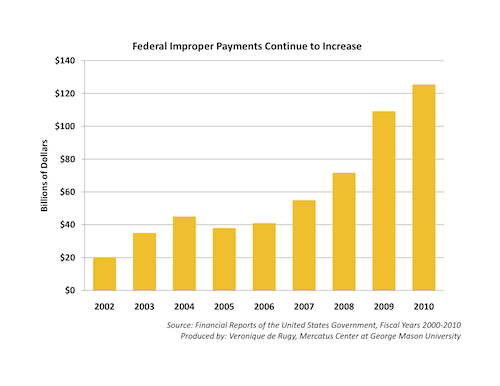- | Government Spending Government Spending
- | Data Visualizations Data Visualizations
- |
Federal Improper Payments Continue to Increase
Veronique de Rugy examines the recent changes in improper payments of the federal government’s funding for its programs and activities.
This week, Mercatus Center Senior Research Fellow Veronique de Rugy uses data from the United States Department of the Treasury [1] and the Government Accountability Office [2] (GAO) to examine recently reported improper payments within the federal government. These improper payments are defined as payments that are either fraudulent or are inadvertent errors (such as miscalculated or duplicate payments, payments for unsupported claims, or services not actually rendered). Since the implementation of the Improper Payments Information Act of 2002 (IPIA), these reported wasteful payments have increased by over 500% to $125.4 billion in fiscal year 2010.
According to the 2010 Financial Report of the United States Government, $ 2.3 trillion in outlays were reviewed by federal executive branch entities for improper payments last year; 5.5% of these payments, or $125.4 billion were found to be improper. This represents an increase of $16.2 billion from the fiscal year 2009 estimate of $109.2 billion. Furthermore, the GAO estimates that at 5.49%, the rate of error across the entire federal government is roughly the same. Put differently, this means that in fiscal year 2010, $189.7 billion in federal spending, or 5.49% of $3.5 trillion, was overt waste.
The increasing level of federal waste observed above can be interpreted two ways. Either the amount of waste in the federal government has been increasing or the amount of waste has remained relatively constant, while federal reviewers are simply becoming more and more adept at documenting it. Under either explanation, overt waste in the federal government represents a significant problem.
With a government-wide error rate of 5.49%, improper payments in the federal government represent an often overlooked cost of expanding federal spending – on average, over $.05 of every dollar of spending is simply thrown away.
Veronique de Rugy testifies about federal waste and abuse before the House Committee on Oversight and Government Reform.

[1] United States Department of the Treasury, Financial Management Service, 2010 Financial Report of the United States Government,http://www.fms.treas.gov/fr/10frusg/10frusg.pdf
[2] Government Accountability Office, Auditor's Report of the 2010 Financial Report of the United States Government,http://www.gao.gov/financial/fy2010/10gao2.pdf, 24, 245

